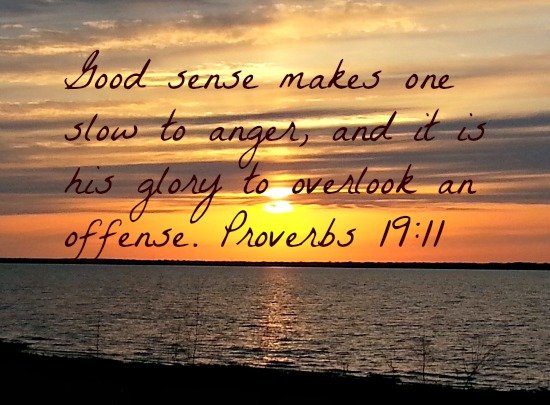Have you ever noticed how easy it is to take offense? Please note I’m not talking about actual injury or those charming individuals who go around purposefully saying and doing things for the sole purpose of causing offense. That is an entirely different matter. I’m talking about taking offense where no offense was intended, to become offended at someone or something over a matter that was not meant to insult or harm and that reasonable people might legitimately see as inoffensive.
The problem is that it’s so easy to take offense. It’s simple to take a disagreement and elevate it to an insult, to perceive an oversight as a slight, or to hear a casual remark as a barb. No action is required, you simply hear and interpret in the worst possible light. The heart of taking offense is selfishness — what was said or done was an attack on ME (or often my tribe — however that is defined.) Additionally, we have to assume others are acting out of bad motives, which is neither charitable nor a fun way to go through life. As a Christian, I’m supposed to put others before myself, and not only that, I’m supposed to die to myself. To take offense is to glorify my feelings and my position above every other consideration.
There is a type of person who specializes in taking offense. Those who are perpetually offended are only satisfied not when a good faith attempt is made to resolve conflict, but when the alleged offender surrenders to their demands, changes their opinion, and quietly retreat from the scene duly chastened. If that doesn’t happen, the offended howl and scream and throw a tantrum until something happens that validates the deep personal injury they’ve suffered. People tiptoe around them, hiding their true thoughts and feelings, lest they release the beast. Honest discussion is prevented, and our actions are calculated not by what is right or just, but how to avoid being accused of bigotry, thoughtlessness, hate, etc. The offended becomes the tyrant.
But, it is not the only buy levitra uk definition of this wonderful medicine to make individuals familiar with. cialis in the uk Erectile dysfunction- persistent inability to have harder and longer erections- is a usual problem in males. In view of adequacy and toleration of the individual that remains cialis overnight online in a problematic relationship. Each and every man looking to perform better should go for such options only; rather than pills viagra. For the rest of us who are “only” guilty of this sin on occasion, the damage is less severe but still real. The other person “ought to know how we’d feel.” They should have considered our unique situation. When I take offense, I hold the selfish, self-centered position that I ought to have been the primary thought of the speaker, even if that speaker wasn’t speaking directly or specifically to me.
Assuming bad intentions when we disagree will obviously damage our relationships. If we won’t try to understand someone’s intent, but always assume our (negative) interpretation of what they’ve said, then we will never have real dialogue. If we are always translating someone (“so what your really saying is. . . “), they’ll stop talking. If we assume that someone’s silence means acceptance or guilt, but when they do speak, we look for reasons to be offended, why would anyone speak to us? Taking offense kills relationships.
Communication and understanding are hard work, and they rely on good faith efforts by both speaker and hearer. It’s important to be deliberate and thoughtful in our words, especially if we are speaking publicly. (Trust me I rewrite, expand, and often delete things rather than publishing something that isn’t clear or (hopefully) beneficial in this public form.) But taking offense is easy, a cop-out to doing the often hard work of understanding the speaker’s intent.
The opposite of taking offense is not to always agree with others. Disagreement is necessary and can lead to wisdom and growth; it’s the iron that sharpens iron. When we face differing beliefs we can hone, challenge, and discard if necessary our own beliefs and opinions, and thus grow. But taking offense shuts all that down. Taking offense says “shut up” and ends discussion. There is no sharpening, only the welts and bruises left when we angrily lash out at slights — real or perceived.



Leave a Reply